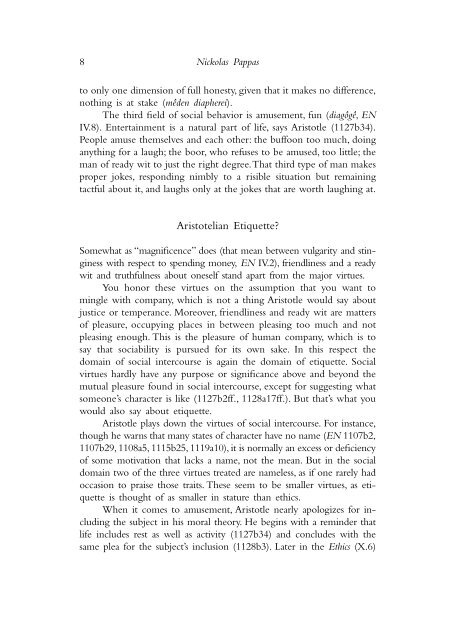Create successful ePaper yourself
Turn your PDF publications into a flip-book with our unique Google optimized e-Paper software.
8 Nickolas Pappas<br />
to only one dimension <strong>of</strong> full honesty, given that it makes no difference,<br />
nothing is at stake (mêden diapherei).<br />
The third field <strong>of</strong> social behavior is amusement, fun (diagôgê, EN<br />
IV.8). Entertainment is a natural part <strong>of</strong> life, says Aristotle (1127b34).<br />
People amuse <strong>the</strong>mselves and each o<strong>the</strong>r: <strong>the</strong> buffoon too much, doing<br />
anything for a laugh; <strong>the</strong> boor, who refuses to be amused, too little; <strong>the</strong><br />
man <strong>of</strong> ready wit to just <strong>the</strong> right degree. That third type <strong>of</strong> man makes<br />
proper jokes, responding nimbly to a risible situation but remaining<br />
tactful about it, and laughs only at <strong>the</strong> jokes that are worth laughing at.<br />
Aristotelian Etiquette?<br />
Somewhat as “magnificence” does (that mean between vulgarity and stinginess<br />
with respect to spending money, EN IV.2), friendliness and a ready<br />
wit and truthfulness about oneself stand apart from <strong>the</strong> major virtues.<br />
You honor <strong>the</strong>se virtues on <strong>the</strong> assumption that you want to<br />
mingle with company, which is not a thing Aristotle would say about<br />
justice or temperance. Moreover, friendliness and ready wit are matters<br />
<strong>of</strong> pleasure, occupying places in between pleasing too much and not<br />
pleasing enough. This is <strong>the</strong> pleasure <strong>of</strong> human company, which is to<br />
say that sociability is pursued for its own sake. In this respect <strong>the</strong><br />
domain <strong>of</strong> social intercourse is again <strong>the</strong> domain <strong>of</strong> etiquette. Social<br />
virtues hardly have any purpose or significance above and beyond <strong>the</strong><br />
mutual pleasure found in social intercourse, except for suggesting what<br />
someone’s character is like (1127b2ff., 1128a17ff.). But that’s what you<br />
would also say about etiquette.<br />
Aristotle plays down <strong>the</strong> virtues <strong>of</strong> social intercourse. For instance,<br />
though he warns that many states <strong>of</strong> character have no name (EN 1107b2,<br />
1107b29, 1108a5, 1115b25, 1119a10), it is normally an excess or deficiency<br />
<strong>of</strong> some motivation that lacks a name, not <strong>the</strong> mean. But in <strong>the</strong> social<br />
domain two <strong>of</strong> <strong>the</strong> three virtues treated are nameless, as if one rarely had<br />
occasion to praise those traits. These seem to be smaller virtues, as etiquette<br />
is thought <strong>of</strong> as smaller in stature than ethics.<br />
When it comes to amusement, Aristotle nearly apologizes for including<br />
<strong>the</strong> subject in his moral <strong>the</strong>ory. He begins with a reminder that<br />
life includes rest as well as activity (1127b34) and concludes with <strong>the</strong><br />
same plea for <strong>the</strong> subject’s inclusion (1128b3). Later in <strong>the</strong> Ethics (X.6)
















